PERSPECTIVES



As we wrap up the spring semester, there are several major developments in the department. First, we welcome Dr. Jihoon Jung as an assistant professor in the fall (see his profile below) Welcome to UNT Geography, Dr Jung! Second, Dr Pinliang Dong has been appointed by Executive Dean Bimper to serve as the next chair of our department beginning in August Congratulations, Pinliang! As we head toward summer, we are currently engaged in a search for a Lecturer in Human Geography The Graduate Program Committee had a successful recruiting period this spring, and we will be welcoming a solid cohort of graduate students in August As a result, there will be new faces in the department in the fall We congratulate Dr Yuting Li who has been promoted to Senior Lecturer; congratulations Yuting! In addition, we had a successful fundraising campaign to support our Geography Alumni Endowment, which has now grown to the point that we can grant scholarships
Thank you to those who donated! Please continue to keep in touch, and enjoy this installment of our newsletter. Finally, we say farewell to Dr. Wei Kang, who has accepted a position at UC Riverside; we really enjoyed getting to know you these last two years, and we wish you the very best.
The spring is always busy with guest speakers, thesis defenses, conferences, research trips, and classes! So, we always try to make time for fellowship! Our teatime events started out as a great low-key social for our department to take a breather. It gradually became a time for fellowship and networking with people from the departments in our building. From there it has grown to a regular event where we host different departments with faculty and students we often collaborate with. We have hosted Emergency Management & Disaster Science, Economics, Political Science, Philosophy, AERI/IAS, Computer Science, and Information Science as well as Executive Dean Bimper. This event has grown into a fun social that we hope continues for years.
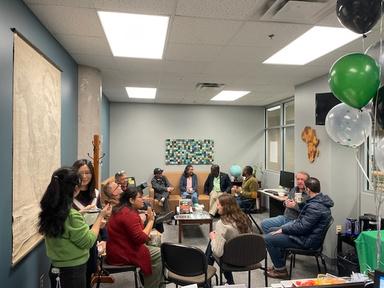

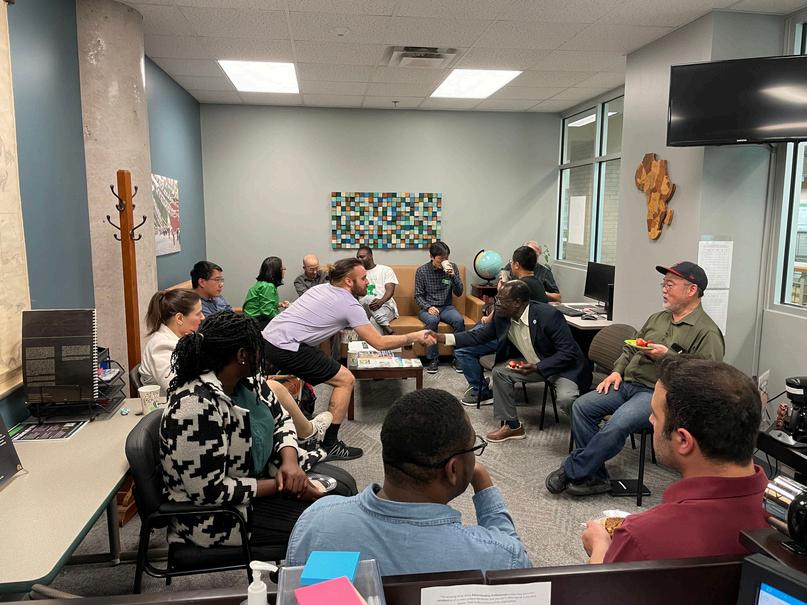
We had another great turnout for our Spring lecturer series, World Leaders in Big Data Analytics, that we co-hosted with the Data Analytics department! Dr. Song Gao, Associate Professor in the Department of Geography at the University of Wisconsin, gave a riveting talk entitled Geospatial AI Approaches to Human Mobility Analytics and Location Privacy Protection, including perspectives on human mobility patterns and human-place interactions. Thank you to Data Analytics for co-hosting this intriguing event!
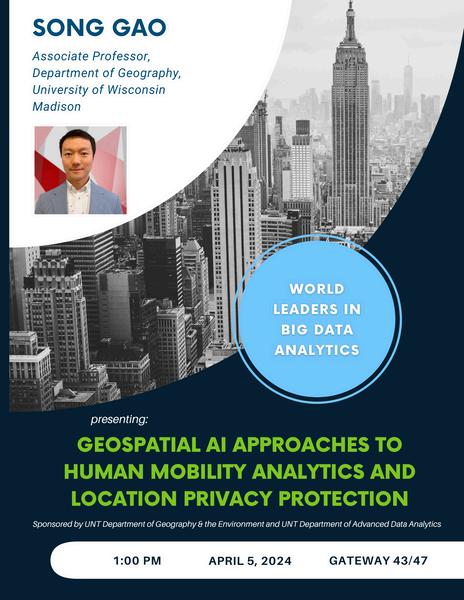

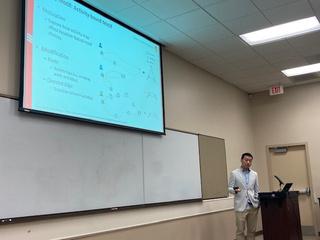
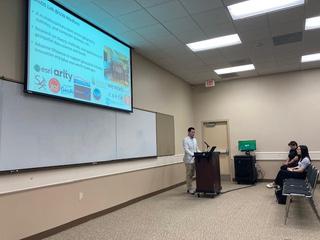

Our department welcomes Dr. Jihoon Jung as an incoming Assistant Professor Jihoon completed a Ph D at Florida State University and a MA at Ohio State University in Geography Then, he did his postdoctoral research in the Department of Environmental and Occupational Health Sciences at the University of Washington and the Department of City and Regional Planning at the University of North Carolina at Chapel Hill. He is a Health and Medical Geographer, with a specialization in environmental health, environmental disparity, and natural disasters using GIS, remote sensing, quantitative methods, and big data. His research investigates how the biophysical and socioeconomic environments influence and interact with human health in a quantitative and geo-spatial contexts.

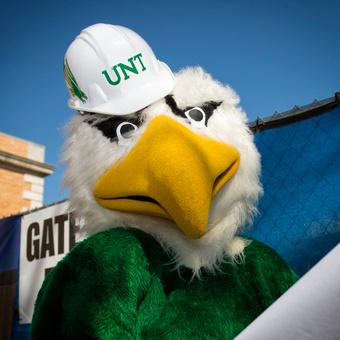

New Internship and Job Opportunities page for students! Our Undergraduate Committee have been hard at work with creating and improving our Internship Experience course, GEOG 4920. It is a great way to earn course credit for an internship. The process of finding, applying for, and completing an internship not only adds to a student’s resume, but it also provides experience in the job search process. To continue reaching more students, we moved our GEOG 4920 Internship Experience module from Canvas to its new home on our website We also added a page for posting job and internship opportunities You can check out the page here!
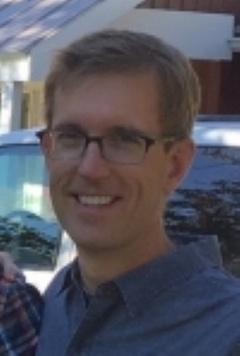
Each issue we highlight one of our amazing faculty in our Faculty Spotlight section We especially want to highlight our adjuncts, who sometimes fly under the radar but are vital to our department This issue, highlights David Ferring, one of our senior adjuncts who teaches some of our most popular courses
Prior to UNT, David taught at Rutgers University in New Jersey as a teaching assistant, leading recitation sections for courses like Introduction to Human Ecology and Politics of Environmental Issues He also designed and taught an upper division seminar for the Department of Human Ecology at Rutgers entitled Globalization, Development, and Environment, which broadly explored development and its impacts on nature and society in different contexts. According
to David, that course was “particularly fun as we drew a lot of readings and case studies from research faculty at Rutgers.”
There were quite a few things that drew David to the UNT Geography program. As a graduate of the program, it has been very rewarding for him to return and teach as an adjunct. It has been “great to reconnect with familiar faculty and staff, as well as see how much the department had grown over the years ” Teaching here at UNT also allows David to draw upon his long-term experience in Denton and the DFW area more broadly by bringing unique opportunities and a wellgrounded perspective to classroom learning
David’s teaching philosophy revolves around helping students to think critically about the world around them, to engage with each other in a constructive, collaborative environment, and to draw upon the diverse experiences that each person brings to the classroom As much as possible, David attempts “to design courses and classroom sessions that involve different learning styles and approaches to course material ” For example, one of his early experiments in fostering discussion in large lecture sections involved a Qball – essentially a Nerf volleyball with a wireless microphone inside that students could throw around the auditorium. It worked really well, but since the COVID pandemic, he unfortunately hasn’t really had the opportunity to use it.
So far, David’s favorite class to teach at UNT has been Map and Field Methods (GEOG 4170) – a course he inherited from Dr. Matt Fry. “I really love this class,” David says, “because each session involves active learning, teamwork, and building many different skillsets. Each week there are unforeseen challenges that arise (just as with any research or professional fieldwork!) and it was really rewarding to interact with the students and see them collectively figure out ways to solve that day’s ‘puzzle’ of data collection.” It also helps that the class is largely outdoors, so he is always sure to get his steps in for the day!
Most of all, David loves teaching because he loves learning, and each week he learns a lot from the students here at UNT Being exposed to so many interesting perspectives, experiences, and ideas often leads David to rethink a concept or case study, or to look afresh at an issue which he might have had a rather fixed stance on
Particularly in the Sustainability course, David loves to design experiential learning opportunities for students “Meeting folks working in different fields,” says David, “can result in such unique insights and understanding of challenges and solutions to environmental problems that might not be as accessible in the classroom ”
Right now, David is working on some articles based on research of small-scale gold mining in Ghana (a research project that began while he was working for Dr Oppong as a Master’s student!) One of these articles is examining the socio-ecological transformations resulting from this industry and the ways in which material gold deposits, environmental governance, and mining knowledge and practice can result in very different outcomes. Another paper engages gendered forms of resistance and care that can emerge from the impacts of gold mining in rural communities.
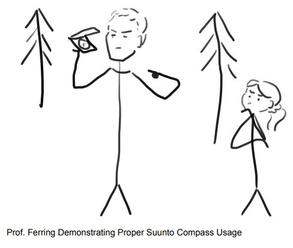 by Caitlin McAdoo
by Caitlin McAdoo

For spring 2024 faculty spotlight we highlight John South one of our newest lecturers. Prior to teaching at UNT, John taught IT courses as an Adjunct Professor at the University of Dallas. In February 2022, John was inducted into the Gupta School of Business Hall of Fame by the Alumni Department of the University of Dallas.
John’s lifelong interest in place drew him to the field of Geography. Through his earlier years, he greatly anticipated the arrival of the new issue of the National Geographic in the mail.
“To see and read about peoples and their cultures, afforded me an opportunity to mentally travel the world, envisaging myself among those cultures. In months where a map was inserted in an issue, I would study that map for hours, learning names of towns, rivers, and
other features ” Equally important to John was the cultural geography presented in NatGeo He was able gain insight on how people around the world lived their lives
His interest in the field of Geography and wanting to apply GIS (particularly using LiDAR and remote sensing) to geographic questions drew John to the University of North Texas Drs Pinliang Dong and Lu Liang expertise enticed John to want to learn from them.
John’s research focus is on, “understanding how new types of sensors and analytical models can improve our understanding of changes in landscape heterogeneity.” He commented that physical geography is on the cusp of change as a science. His research focuses on using unmanned aerial vehicles in combination with LiDAR and satellite imagery so that he can observe “the structural and compositional changes in the landscape due to man’s interaction with the environment.” John notes that the role that computer science plays in geography has improved the field’s computational efficiency, particularly with GIS products and their influence through applications of more powerful analytical models. John is also interested in the application of artificial intelligence and deep learning models. Especially how they improve the ability to interpret structural and compositional changes in environments that he is studying.
John’s philosophy when it comes to teaching is creating a learning environment for student development along a continuous spectrum of skill sets (i e , theory to methodology to practical application to research) He provides students with the theory and geographic concepts that they need to gain understanding of tasks while using GIS software This moves forward into understanding how to use particular tools to execute a specific function Once they have a grasp on methodology, John tasks students with completing a practical application of the toolsets and then has them showcase their knowledge by applying GIS tools in their own research John notes that, “every student is unique and the challenge to teaching is to understand where each student is on that continuum ”
In past few years of teaching at UNT, John favorite class to teach so far is GEOG 4530 Digital Imagery Analysis and Remote Sensing. He mentioned that this course gives students a great opportunity to learn “some powerful skills” in GIS that they can apply to issues that they may face.
One of John’s favorite things about teaching is that “aha moment” when students finally “get it” and they can see how the various elements that they have been learning about fit together. Figuring out how those parts fit together provides them with the tools to comprehend various geographic questions.
John’s most recent accomplishment was being appointed as a Lecturer in the Geography department. In addition, John is now the new faculty advisor for the GIS + CS degree. This opportunity provides him with a chance to interact with students that he may not see in class. It also allows him the chance to meet incoming students who may need guidance and direction in their academic journeys. If you’re hanging around the Environmental Science building, stop by the Geography department to say hello John!
Dr. Pinliang Dong is on faculty development leave this semester Among other research activities, he and his co-authors are completing a book entitled “Introduction to LiDAR Remote Sensing” (Wang, Yang, Xi, Nie, and Dong), to be published by Taylor & Francis/CRC this year The book has six chapters: (1) Introduction, (2) Principles of LiDAR remote sensing; (3) LiDAR data acquisition, (4) LiDAR data processing, (5) LiDAR remote sensing applications, and (6) Prospects of LiDAR remote sensing. Compared with “LiDAR Remote Sensing and Applications” (Dong and Chen, Taylor & Francis/CRC, 2017) which focused on airborne LiDAR data, the new book includes LiDAR data from spaceborne, airborne, terrestrial, mobile, and UAV (drone) platforms. The book also addresses the challenges of massive LiDAR data processing, LiDAR software engineering, and in-depth applications of LiDAR data in powerline corridor inspection, automatic driving, crop monitoring, indoor navigation, and cultural heritage conservation, among others.
In Spring 2024, Dr. Yuting Li taught three classes including GEOL 1610 Intro to Geology, GEOG 1710 Earth Science, and GEOG 4260/5260 Oceanography Dr Li integrated new teaching strategies, designed engaging inclass activities, and employed new feedback surveys to promote more active learning In Oceanography, we discussed a variety of oceanic and societal topics Students had opportunities to comment and write on many topics including Ocean Acidification, Global Climate Change, Great Pacific Garbage Patch, El Nino, Water Energy, etc. Students also held a final debate at the end of the semester to dig deeper into some topics that they have particular interest in and conduct independent research on. Dr. Li also continues serving as GEOL 1610 lab coordinator, undergraduate faculty advisor, and member of undergraduate committee in our department, enjoying having a variety of opportunities to communicate with our current and potential major students.
Dr. Joseph Oppong recently received triple accolades for his contribution to the field of Geography, his impact at UNT, and his dedication to improving graduate students’ educational experience Those awards are: Fulbright U S Scholar Award for the fall to teach and provide Faculty and graduate mentoring in Ghana; Assistant and Associate Dean’s Leadership Award, UNT Foundation Faculty Leadership Award, and elected to the Honors Committee of the Association of American Geographers Read more about Joseph’s Story on our website under Stories
Mara Hedrich is leading an exciting new initiative aimed at engaging high school students with the dynamic opportunities within the field of geography. Recognizing the need to dispel outdated perceptions of geography as mere memorization of capitals, Mara seeks to illuminate the breadth and depth of this discipline to inspire the next generation. Drawing from her own experience, Mara understands the importance of providing high school students with a richer understanding of geography and its relevance to the world around them. By leveraging the expertise and diversity of our current UNT geography students, Mara plans to narrow the generational gap and foster meaningful connections. Through interactive sessions featuring students of diverse backgrounds, genders, and ethnicities, high school students will have the opportunity to see themselves reflected in the world of geography. UNT Geography students will share their personal journeys, from navigating college admissions to exploring career pathways, offering invaluable insights into the possibilities within the field. By fostering a deeper understanding of geography and its myriad applications, Mara hopes this initiative will not only enrich the knowledge of high school students but also inspire a new wave of prospective geography students to join our department, ultimately bolstering our enrollment numbers. More updates will be provided as this initiative unfolds.
UNT Geography has seen numerous trips, events, accomplishments, and stories throughout its lifetime as a department. There have been a number of stories written over the years to encapsulate our history of events. Here is a blast from the past about our Geography Club!
- author unknown
The Geography Club had its first outing on Saturday, March 31st. Eight undergraduate geography students piled into two cars and hit the road to explore some of the landscape features of Denton County with student-manufactured held guide in hand. First stop on the field excursion -- Rayzor Ranch, where the club collected and identified lower Cretaceous fossils (oysters, turrelites, and scallops) examined tumbleweed and pondered on the site's future development. From there, the group headed to Cardo's Farm Project in Ponder, where Tristan Bynum, a member of the club and an intern at the farm, showed off a heavy-duty solar oven, hen houses, green houses, farm class rooms and vegetable gardens The group learned about the farm's history and how it involves people in their farming project The third and final destination was an inspiring point on Denton's landscape and a place where regional culture, Cross Timber ecology, and Woodbine sandstone geology come together, or as club member Michael Hunter put it, "thick groves of trees and sandstone summit, the knob has mirrored the story of the west itself, of a wildness lost to development, and of a time being more and more forgotten " All in all, the excursion lasted four hours and everyone agreed it was a successful day of exploration of the fascinating geography around UNT
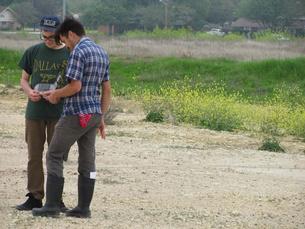
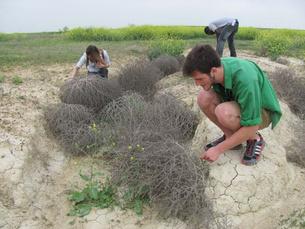
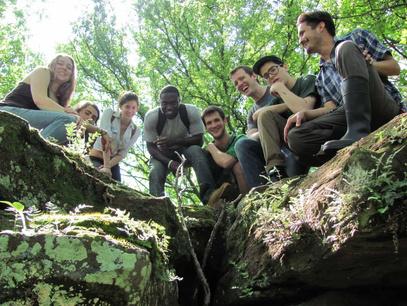
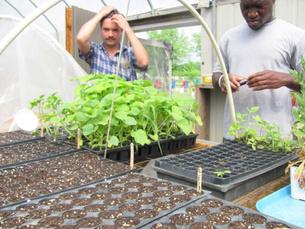

Our students had a busy semester - from special projects to presenting research work. We are proud of all their accomplishments this spring!
GEOG 2170 Best in Class for Project 1
We would like to congratulate David Brooks for being awarded Best in Class for Project 1 in our GEOG 2170 Culture, Environment & Society course. To learn more about his project, read an exert from Mara Hedrich’s award announcement:
“In Project One, titled "Constructing a Thematic Map," David demonstrated exceptional creativity, analytical thinking, and attention to detail The assignment tasked students with constructing two thematic maps, delving into the intricate process of map-making, and exploring various sources of bias based on data classification methods
David's submission focused on the Annual Growth Rate of populations in African countries, meticulously mapping out the data for the year 2022 and employing two distinct classification schemes for comparison Through his thoughtful analysis, David illuminated the inherent biases in map creation and showcased the power of visual storytelling
What truly sets David's work apart is his innovative scenario development. Drawing on a hypothetical humanitarian crisis scenario, David envisioned the practical application of his maps in aid distribution efforts. By strategically utilizing the growth rate maps, he devised a method to prioritize aid to countries most in need while considering different stakeholders' perspectives.”
To read more about the project you can visit Mara Hedrich’s LinkedIn page here.
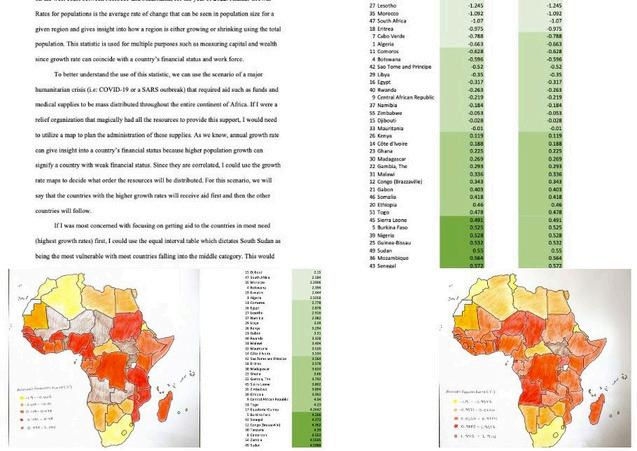
Preview Day went off without a hitch! Thanks to our two ambassadors Rylee Henderson (front left), Ariana Mendoza (front right), and Emma Norris (back middle) our potential future ambassador, we had a lot of people stop by our table! We are thankful to our Ambassadors and all their work to help promote our programs!



This year for Scholars' Day Evangeline Dwelle presented a poster and Matthew Huizar presented a paper titled, “An interactive web application for visualizing low-income housing tax credit allocation and transition dynamics in DFW ” This event is hosted annually by UNT's Office of the Provost and Vice President for Academic Affairs and the Honors College The event on April 2nd celebrated undergraduate students’ work as researchers and contributors in our academic community.

GEOG 3200 Sustainability got to visit the Josey Pavilion of the Dixon Water Foundation. They got to learn about cattle rotation in an adaptive multi-paddock grazing system.

and climate conditions ”
Andrew Gillreath-Brown studied with Dr. Lisa Nagaoka and graduated with his master's in Applied Geography from UNT in August 2016. His thesis was titled, “Looking Outward from the Village: The Contingencies of Soil Moisture on the Prehistoric Farmed Landscape near Goodman Point Pueblo” In his research, he designed a geospatial method that would allow him to “estimate soil moisture variability as a predictor for prehistoric agricultural landscapes ” He was able to evaluate risk change over a period of time by using the “distance between farmland and sites, and the regional history.” From there Andrew continued his research by looking into the habitats of the Ancestral Pueblo people. He wanted to learn how they reduced risk for example, “building sites in defensive locations surrounding water sources or developing sustainable agricultural practices to be resilient to changing socio-cultural
Some things that Andrew feels has set him apart from his peers who were educated at other institutions were his mentors, the knowledge they shared, and the different perspectives he was able to experience while enrolled in our program. He mentioned that he was lucky to have two mentors that he really admired and taught him so much about “conducting good research.” Working with Drs. Lisa Nagaoka and Steve Wolverton, Andrew learned how to think outside of the box, conduct research and present that information, and other professional development skills During this time in his educational career he talked about how he became a better writer Andrew came to UNT with a background in anthropology Joining the Geography Department at UNT, he got to experience “geographical thought, research, and analysis ” This expanded his research focus and thought processes that gave him a deeper understanding of the “geospatial world ” These experiences helped separate him from his peers in the field He left the department with a proficient knowledge that allowed him to navigate and use GIS, and to be able to work large datasets (e.g., environmental datasets). He contributes this knowledge to his class assignments that were based on real problems where he was able to work with real datasets to solve various problems. This gave him the skills to be able to handle different scenarios in the workplace compared to if his assignments were only hypothetical situations.
One aspect that most people do not think about is the type of work environment they want to work in Andrew felt that his time in the Geography Department was very positive and supportive During his time their he felt, “there was a real sense of comradery and collaboration in the department, where professors genuinely care about and invest[ed] in their students, and peers in the department really help[ed] each other out too.” His time at UNT helped influence the path he choose when going in his PhD program and career path.
Not only did Geography influence the type of work environment and how he wanted to approach his future careers (i.e., educational and professionally), his perspective on how he looked at the world became more complex He started looking at the world through a geospatial lens and study his surrounding to really get a “sense of place and space ” Through his studies he learned how geography could be used as a tool to be influential in our world (e g , mitigate and advocate about global warming impacts) This led him to focus on climate reconstruction in his PhD program Andrew wants to “bridge the gap between our past climate knowledge and the present, and help to address modern climate change ” Andrew stated that research has shown that climate change disproportionately affects those that are more vulnerable. So, in an effort to make impacts in real-time, Andrew applies various background knowledge (i.e., geography, anthropology, archaeology, environmental and climate systems) to assist him with this endeavor.
During his time at UNT he also started to think about landscape, human-environment interaction, people’s resiliency, and their response to change He found a love for working with data and exploring new ways of using different types of data
Currently, Andrew works at Yale University as a Data Scientist on a Climate Change Communication program in the School of Environment. As a part of the data team, Andrew works on creating models that provide regional predictions for extreme weather concerns. Other models that he works on creating are multilevel models (e.g., climate opinion maps) for factsheets and maps. He also works on “microtargeting models that identify individuals belonging to different segments of Global Warming’s Six Americas ”
As a former student we asked Andrew to share some advice to our students: “Look for interesting research opportunities that will help you to build new skills and be open to those different projects because it could open up whole new career opportunities, as it did for me. I actually came to UNT thinking I was going to do traditional zooarchaeology (the study of animal remains at archaeological sites), but I got the opportunity to work on a very different type of project and so I fully jumped into it and that became my thesis and why I became so confident in geospatial analysis, as well working with hydrological, soils, elevation data, and many other types of environmental data ”
Some of Andrews fondest memories while in Denton are departmental gatherings, food, fellowship and extracurricular activities One fond memory that he mentioned was the statues in front of the Environmental Science building wearing sweaters! He enjoyed the end of the week socials where faculty and students got together enjoying good food from the food trucks and fellowship. It gave him a sense of camaraderie and family. He also thought the office staff were “rockstars.” He spent time grabbing coffee in the Environmental Science building from Alex’s cart. He built a relationship with Alex and got to experience kopi luwak also known as civet coffee. He said it was an interesting flavor that he will never forget. Andrew loved when he and his partner lived downtown. They were able to walk around downtown and go to his favorite places to get food. During his time here, he also had the opportunity to take research trips to southwestern Colorado Getting to experience the place that he was studying in-person helped him fully understand his research in way that he could not get from his studies
Current awards, nominations, or accomplishments:
Andrew’s article “A Low-Frequency Summer Temperature Reconstruction for the United States Southwest, 3000 BC – AD 2000” was published in the Holocene in January 2024.
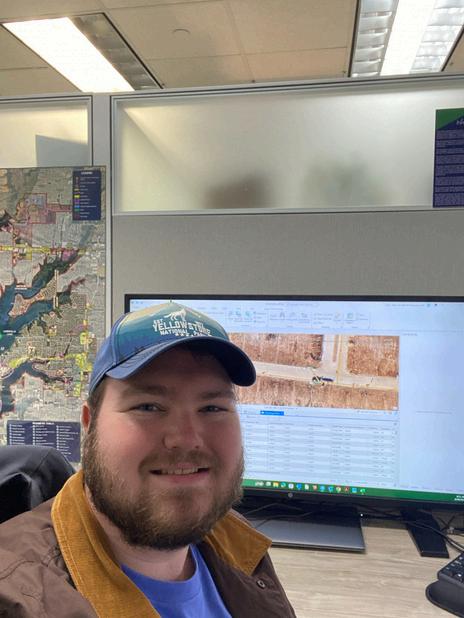
Levi Briggs graduated from the GIS+CS program December 2023 Since graduating, he was offered a job as a GIS technician for the Town of Little Elm He has been working there for a little over two months and comments that, “[he has] already learned a ton and [has] worked on a variety of really cool projects.” A few of those projects are a webmap that he made last month, GPSing town assets, maintaining and cleaning the companies databases, and writing Python and Arcade scripts

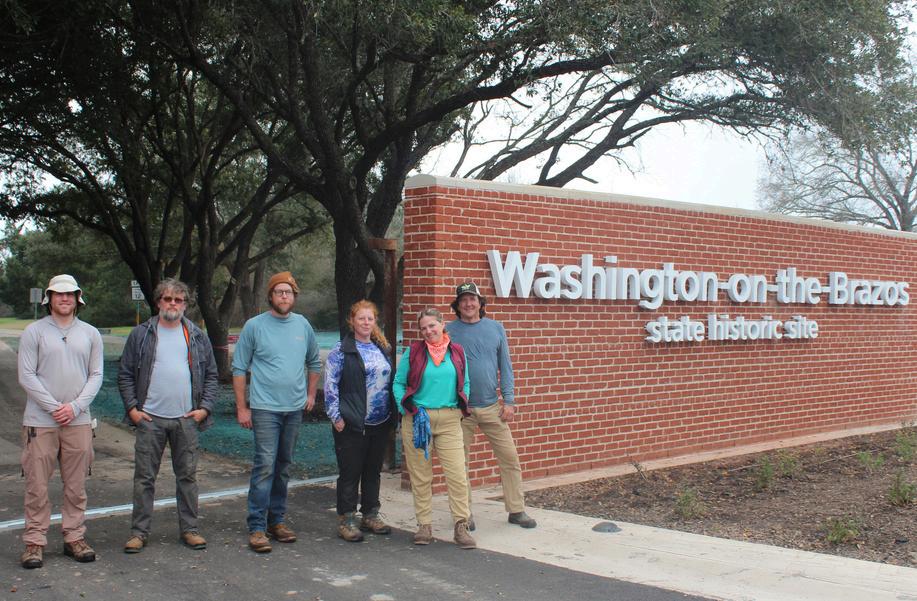
Alexandra Younger a 2019 MS graduate student in Geography is a professional archeologist working for a cultural resources firm located in Denton. She is the Principal Investigator for the recent data recovery excavations at Washington-on-the-Brazos State Historic Park, also known as the “Birthplace of Texas” The Texas Historical Commission has received state and private funding towards the reconstruction of mid-nineteenth century buildings related to the events and major players of Texas Independence Alexandra and her team led the investigations beginning in 2023 to locate and identify domestic and architectural remains of these loci including a tavern where David Crockett once stayed, Sam Houston’s Office, and Hatfield’s Exchange where the 8th and 9th Texas Congress assembled. Thousands of artifacts have been collected, which will be analyzed for the purpose of informing the reconstruction that will turn the park into a living history museum that is due for completion in 2025.
If you're an alum of UNT Geography and the Environment, let us know what you've been up to! Send an email to geog@unt edu and we will try to include you in our next newsletter
SUPPORT OUR STUDENTS AND RECEIVE A T-SHIRT AS A THANK YOU!
By supporting current students, we aim to foster a legacy of excellence in Geography, promoting diversity, collaboration, and innovation in North Texas and beyond This vision unlocks opportunities for future alumni achievements! With your donation of $20 we would like to express our gratitude by giving you a Geography Tshirt (while inventory last)! You can donate here
Our visit our website: https://geography unt edu/support-us/supporting-studentsdonate-receive-t-shirt
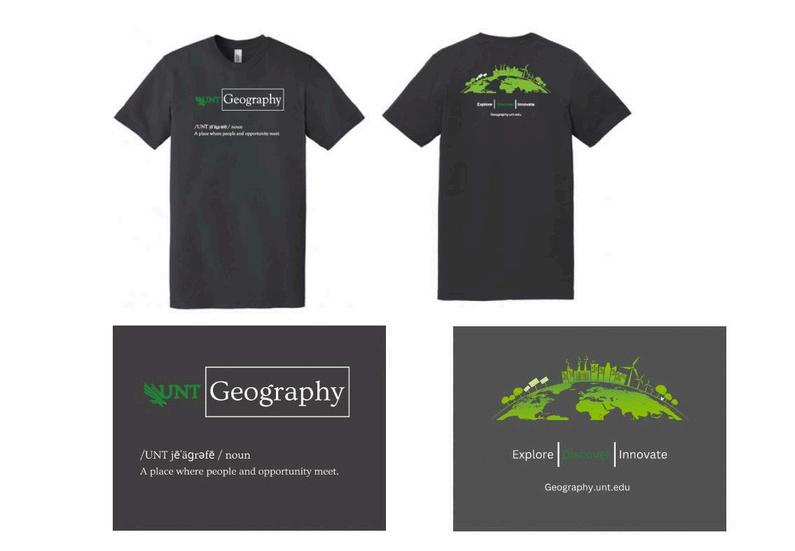
On April 19th we hosted our annual Student Award Ceremony reception at the Gateway It was wonderful to gather with students and faculty to recognize our honor roll students, graduates, and special awardees. Here are some pictures from the event!

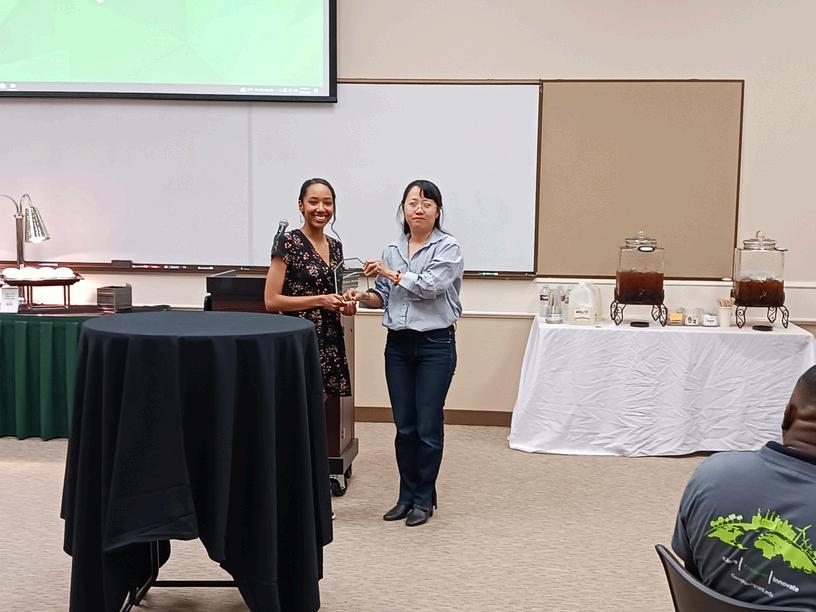
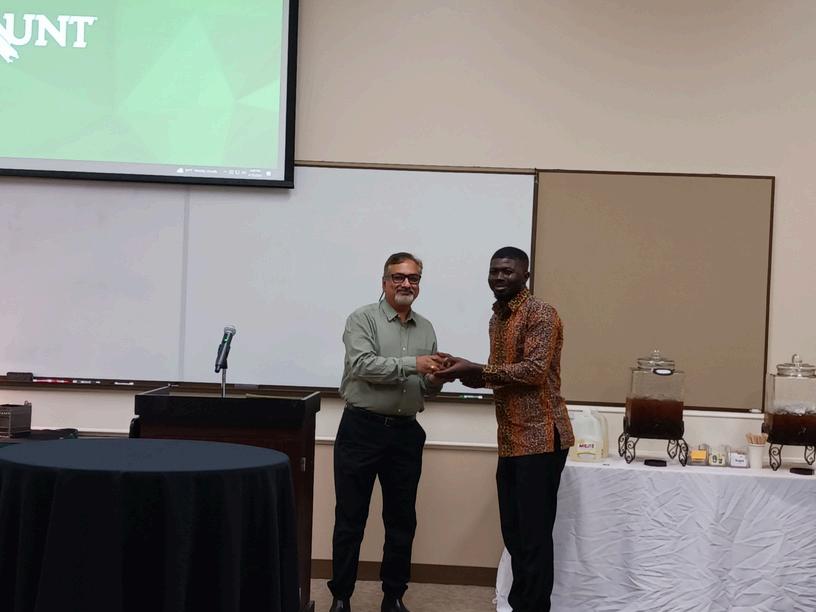


Bachelor of Science
Graduates:
Valerie Alvarado
Rylee Babino
Marsh Baker
Nathan Belles
Tyler Brooks
Edwing Castellon
Rachel Dawson
Evangeline Dwelle
Parker Essary
Morgan George
Riley Henderson
Kenny Hoong
Colby Johns
Grace Martin-Young
Ariana Mendoza
Samantha Mercer
Sam Merritt
Ivan Moreno
Brand Richter
Kyra Shank
Jenny Waters
Bachelor of Science in Geographic Information Systems & Computer Science Graduates:
Matthew Huizar
Kyle Rainwater
Gordon Walcott
Master of Science Graduates:
Injal Bhattarai
Madeline Crawford
Erin Jones
Ronney Phillips
Spence Stegall
Prashant Thapaliya
Larry Voice
PrashantThapaliya
GeospatialTechnologyScholarship
SaideMahama
HumanGeographyScholarship
RyleeBabino
SchoolmasterOutstandingUndergraduateStudent
PrashantThapaliya
SchoolmasterOutstandingGraduateStudent
Honor Roll (Undergraduate)
Rylee Babino
Marsh Baker
Nathan Belles
Easton Bradford
Tyler Brooks
Brett Burdick
Sofia Camacho
Evangeline Dwelle
Lillian Eaken
Christina Fackler
Sefanie Feltman
Avery Foltz
Morgan George
Sandra Guevara
Lilith Hernandez
Jamison Huffman
Ronnie Johnson
Joshua Jones
Kadie Kakay
Hans Kohlmorgen
Kathryn Krueger
Aaron Leigh
Tarun Kumar reddy Lingala
Jennifer Long
Laura Lopez
Grace Martin-Young
Laurie Medina
Ariana Mendoza
Andrew Merrill
Sam Merritt
Keaton Morales
Ivan Moreno
Emma Morris
Aletris Oles
Skylar Orr
Zachary Pawlik
Julia Prokop
Abigail Pyle
Declan Quinn
Shazia Rajan
Nick Reedy
Jack Roberts-Abbott
Riley Roder
Lili Ruelas
Maygan Salazar
Kyra Shank
Ella Selden
Salima Shahjhan
Carson Smith
Hien Trinh
Samantha Tovar
Emma Trolinder
Easton Vanover
Jenny Waters
Honor Roll (Graduate Students)
Agim Bardhi
Injal Bhattarai
Madeline Crawford
Erin Jones
Sushant Koirala
Nicholas Lawson
Saide Mahama
Clinton McBride
Ronney Phillips
Daniela Serrano
Suraj Sharma
Spencer Stegall
Priscilla Tetteh
Suman Thakuri
Prashant Thapaliya
Paola Vazquez
Larry Voice
It has been a pretty busy semester for our department We held another faculty search where we can proudly say we will be welcoming a new faculty member this coming fall! We are excited to add Dr. Jihoon Jung to our faculty. We had another successful speaker series lecture as well. It has been fun collaborating with Data Analytics and I cannot wait to see what next spring holds.
Our department has been undergoing some transitions that can be bitter sweet! As we welcome new members we say goodbye to Dr Wei Kang as she continues her career at the University of California - Riverside. We are excited for Dr. Kang’s next journey in her career but we will miss her here at UNT. We will also be welcoming our new Chair Dr. Pinliang Dong as Dr. Steve Wolverton steps down to pursue other opportunities in his career. We are grateful for all his hard work and guidance that he has put into helping our department grow to the next phase of our life in the College of Liberal Arts and Social Sciences We are sad to see him go but we are all happy for his next steps in his career
Throughout the year our faculty teach our many different courses, conduct research, and attend other continuing professional development activities. It is always nice when we get a chance to celebrate with them! This year, we were able to celebrate with Dr Joseph Oppong and his many accomplishments mentioned earlier in the newsletter We were also able to celebrate with Dr Yuting Li and her promotion to Senior Lecturer! We are so proud of Yuting and Joseph’s accomplishments. The hard work that all of our faculty put into the field of Geography and future geographers are needed and greatly appreciated!
The summer is just around the corner! Summer courses have begun, faculty and students will be working on research and hopefully taking a needed break, and staff will be preparing for the upcoming academic year and taking a relaxing break as well!
So, here is to another spring semester full of proposal defenses, comp exams, conferences, student awards and graduation!
Congratulations to all of our graduates, and good luck to those defending and proposing their theses I hope everyone gets a few moments this summer to relax
C H E E R S , K . W .
